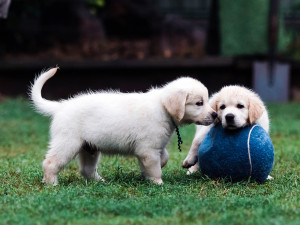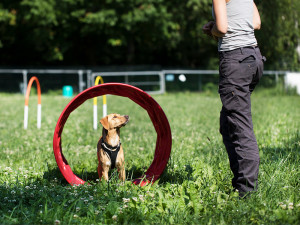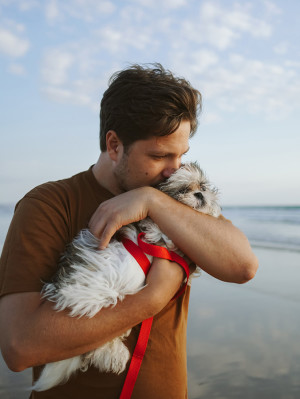Can Puppies Eat Adult Dog Food?
They might want to hurry up and be a big kid, but here’s why it’s good to wait
In this article:
Puppy nutrition Puppy food vs adult food What happens if a puppy eats adult dog food? When to switch a puppy to dog food
While it may be convenient to feed your puppy the same food as your adult dog, puppies have specific nutritional requirements that differ from those of adult dogs. Feeding a puppy adult dog food that isn’t approved for all life stages could lead to nutrient deficiencies, improper growth and long-term health consequences.
Puppy nutrition
Bringing a new puppy into your household can be a source of great joy but also great stress, especially if it’s your first time raising a puppy. Puppy parenting leads to pondering interesting things about your new bestie like:
How did they fit that in their mouth?
Can it ever not be playtime?
How does something so small make poos that big?
One important question you’ll need to answer early on is “What can puppies eat?” This question will have a different answer, depending on who you ask, because people have very strong opinions about pet foods. In short, there’s no agreed-upon best food for puppies. In general, your puppy should eat a diet that checks the following boxes:
It’s within your budget.
It tastes good to your puppy.
It keeps your puppy at a healthy body weight.
It results in poos that are formed but not rock hard.
It helps maintain a healthy coat.
It’s balanced to support their growth and development.
Most of those are easy to keep track of, but the last one can be tough for pet parents to figure out. Puppies are rapidly growing balls of energy, so their bodies require more fuel than you’d expect. In fact, puppies can require two to three times as many calories as adult dogs of the same size. Puppy foods are formulated to optimise growth and development by having:
Higher protein and fat content
In addition to providing energy, proteins help supply the building blocks for muscle, immune system and mental development. Fats help with absorption of certain vitamins, provide concentrated energy and help with hormone production.
Specific vitamin and mineral ratios
Puppies have increased requirements for some minerals, especially those involved in bone growth like calcium and phosphorus. Puppy foods supply these in specific ratios to avoid side effects from too much or too little of these important components.
Calorie-dense formulas
Puppy foods pack in the calories so that your puppy doesn’t need to eat until they’re stuffed to keep up with the energy that they’re burning. A super-full stomach can be pretty uncomfortable and has to work pretty hard to break down extra-large meals. Calorie-dense foods can help reduce stomach upset and make meals easier to digest.
Puppy food vs adult food
If you have a multi-dog family, you might wonder if the difference between puppy and adult dog food is big enough that you have to buy special dog food for puppies. It can be a pain keeping your dogs separate and making sure each one only eats the food they’re supposed to. It seems like dogs always want to see what’s in each other’s food bowls, so it would be a lot easier if you could just feed everyone the same thing.
Unfortunately, that’s not the best idea because of the increased nutritional needs that growing puppies have. There are some key differences between recommendations for the nutritional content of puppy and adult dog foods.
Protein and fat content composition
Protein requirements for puppy foods are about 25 percent higher than those for adult foods. Puppies require almost double the amount of many of the individual amino acids like arginine, lysine and phenylalanine that make up proteins. These amino acids are vital to their development. Fat requirements for puppy foods are also increased – the minimum required fat content for puppy food is about one and a half times that of adult dog food.
Vitamin and mineral composition
Puppies have an increased need for many minerals to support their growth. Calcium and phosphorus have some of the biggest increases because they’re a big part of bone development.
Other minerals, like iron, copper, sodium and chloride are also needed in larger amounts to support immune system development, cell growth and red blood cell formation. Surprisingly, the vitamin requirements for puppy and adult dog food are identical.
Kibble size and texture
Puppy foods can come in smaller kibble sizes than those available for adult dogs, especially in formulations made for large or giant breeds. These smaller kibbles help make it easier for puppies to chew and reduce the risk of choking. Puppies can be voracious eaters though, so don’t hesitate to try some slow-feeding options to force them to savour their food a little bit.
Calorie content
Packing more calories into a smaller volume makes things easier on your puppy’s stomach. This can help cut down on the post-meal pot belly that many puppies get. But does puppy food have more calories than adult food no matter what? Not always. Some performance adult diets made for active dogs with heavy workloads may actually be more calorie-dense than puppy foods.
What happens if a puppy eats adult dog food?
If your mischievous puppy sneaks a little of your adult dog’s food, there’s not much risk of a problem except for possible upset stomach. Adult dog foods formulated for maintenance aren’t harmful to puppies unless they’re consistently the only thing a puppy is eating.
Feeding a diet made specifically for puppy growth is easier and helps take one worry off your plate. Puppies who are fed adult diets can suffer from:
Nutrient deficiencies
Adult diets may be short on some of the vital amino acids and minerals that puppies need for growth. This could cause deficiencies with their immune system, mental development and bone development.
Orthopaedic issues
Puppies can suffer from bone development issues like rickets (softening and weakening of bones) when they lack essential vitamins and minerals like calcium, phosphorus or vitamin D. The ratio of all these elements in the food is important so that they are absorbed by the intestines and used by the body properly.
Obesity or undernourishment
Keeping up with a puppy’s calorie requirements as they grow can be a challenge. Puppy foods often have helpful feeding guides based on your puppy’s age and weight so that you can adjust feeding amounts as they develop. Feeding an appropriate amount means that you don’t have to worry about your puppy exceeding or falling behind their ideal weight.
When to switch puppies to adult dog food
Puppies eventually stop growing, which means that their calorie and nutrient needs will decrease. Once they’ve hit the maintenance phase of their life, feeding an adult dog food is needed to avoid weight gain and over-supplementation of nutrients. Nutritionists recommend transitioning puppies onto adult dog foods when they’ve reached about 80 percent of their expected size, which is at 12 months of age for most dogs.
General guidelines for different breeds
Dogs develop at different rates based on their size. Small and medium dogs are usually ready to make the move to adult food by the time they’re a year old. Large-breed dogs may need to be fed puppy food until they’re 18 months old, and some giant-breed dogs continue growing until they’re two years old. Your veterinarian can help guide you on when it’s time to switch your dog’s diet.
Importance of gradual transition
Whenever you’re introducing a new food to your dog, it’s best to do it gradually. Switching to a new diet can cause stomach upset, even if you’re keeping the brand of food and protein source the same. No one wants to deal with vomit and liquid poo if they don’t have to.
How to choose the best adult dog food
The requirements for an adult dog food are similar to the ones for a puppy food, except that the diet doesn’t need to support growth and development. Pick something your dog likes to eat that doesn’t break the bank and make sure they’re maintaining a healthy body condition, coat and digestion while on it.
Frequently asked questions
How much should a puppy eat?
The amount a puppy should be fed will change throughout their development. The label on your puppy’s food can help guide feeding amounts, but you and your vet may need to discuss adjustments based on your puppy’s growth.
Is it OK to give a puppy regular dog food?
Although sneaking a little bit of an older housemate’s food shouldn’t cause serious problems, puppies should be fed a diet that’s formulated to support their growth. Puppy foods contain increased amounts of essential nutrients needed for development.
What can puppies eat?
Puppies should eat a diet made for growth and development. Many puppy foods are formulated for specific breeds or sizes, so pick one that fits your puppy’s profile. If you want to give your pup some kitchen snacks, always make sure it’s safe first.
References:
UK Pet Food – Choosing the Right Type of Prepared Food For Your Dogopens in new tab
Dystrophies Associated with Calcium, Phosphorus, and Vitamin D in Animalsopens in new tab
















